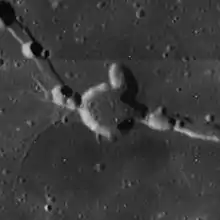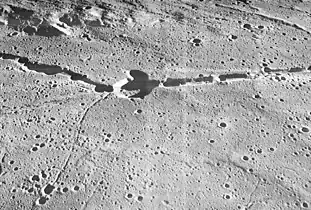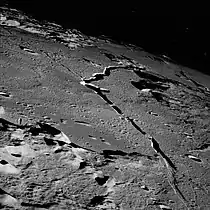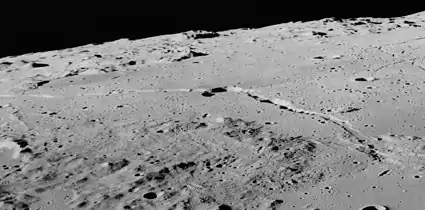Hyginus (crater)
Hyginus is a small lunar caldera located at the east end of the Sinus Medii. It was named after ancient Roman astronomer Gaius Julius Hyginus.[1] Its rim is split by a long, linear rille Rima Hyginus that branches to the northwest and to the east-southeast for a total length of 220 kilometers. The crater is deeper than the rille, and lies at the bend where they intersect. Together the crater Hyginus and Rima Hyginus form a distinctive and prominent feature in an otherwise flat surface. Smaller craterlets can also be discerned along the length of this rille, possibly caused by a collapse of an underlying structure.
 Lunar Orbiter 4 image | |
| Coordinates | 7.8°N 6.3°E |
|---|---|
| Diameter | 11 km |
| Depth | 0.8 km |
| Colongitude | 354° at sunrise |
| Eponym | C. Julius Hyginus |
Hyginus is one of the few craters on the Moon that was not created as a result of an impact, and is instead believed to be volcanic in origin. It lacks the raised outer rim that is typical with impact craters.
Hyginus was also considered a possible landing site during the Apollo Program, because it was thought to possibly be a site of active volcanism.[2]
Views
 Lunar Orbiter 3 image
Lunar Orbiter 3 image.png.webp) LRO image of Hyginus (lower right) and part of Rima Hyginus
LRO image of Hyginus (lower right) and part of Rima Hyginus Oblique view from Apollo 10
Oblique view from Apollo 10 Oblique view from Apollo 17
Oblique view from Apollo 17
Satellite craters
By convention these features are identified on lunar maps by placing the letter on the side of the crater midpoint that is closest to Hyginus.
| Hyginus | Latitude | Longitude | Diameter |
|---|---|---|---|
| A | 6.3° N | 5.7° E | 8 km |
| B | 7.6° N | 5.1° E | 6 km |
| C | 7.7° N | 8.3° E | 5 km |
| D | 11.4° N | 4.3° E | 5 km |
| E | 8.7° N | 8.5° E | 4 km |
| F | 8.0° N | 8.6° E | 4 km |
| G | 11.0° N | 6.0° E | 4 km |
| H | 6.0° N | 7.0° E | 4 km |
| N | 10.5° N | 7.4° E | 11 km |
| S | 6.4° N | 8.0° E | 29 km |
| W | 9.7° N | 7.7° E | 22 km |
| Z | 8.0° N | 9.5° E | 28 km |
References
- "Hyginus (crater)". Gazetteer of Planetary Nomenclature. USGS Astrogeology Research Program.
- To a Rocky Moon: A Geologist's History of Lunar Exploration. Don E. Wilhelms, University of Arizona Press (1993), Chapter 10. ISBN 978-0816510658
- C.G. Wood (2006). "The Moon's Mystery Rilles". Sky & Telescope. 112 (3): 54–55.
- Andersson, L. E.; Whitaker, E. A. (1982). NASA Catalogue of Lunar Nomenclature. NASA RP-1097.CS1 maint: ref=harv (link)
- Bussey, B.; Spudis, P. (2004). The Clementine Atlas of the Moon. New York: Cambridge University Press. ISBN 978-0-521-81528-4.CS1 maint: ref=harv (link)
- Cocks, Elijah E.; Cocks, Josiah C. (1995). Who's Who on the Moon: A Biographical Dictionary of Lunar Nomenclature. Tudor Publishers. ISBN 978-0-936389-27-1.CS1 maint: ref=harv (link)
- McDowell, Jonathan (July 15, 2007). "Lunar Nomenclature". Jonathan's Space Report. Retrieved 2007-10-24.CS1 maint: ref=harv (link)
- Menzel, D. H.; Minnaert, M.; Levin, B.; Dollfus, A.; Bell, B. (1971). "Report on Lunar Nomenclature by the Working Group of Commission 17 of the IAU". Space Science Reviews. 12 (2): 136–186. Bibcode:1971SSRv...12..136M. doi:10.1007/BF00171763.CS1 maint: ref=harv (link)
- Moore, Patrick (2001). On the Moon. Sterling Publishing Co. ISBN 978-0-304-35469-6.CS1 maint: ref=harv (link)
- Price, Fred W. (1988). The Moon Observer's Handbook. Cambridge University Press. ISBN 978-0-521-33500-3.CS1 maint: ref=harv (link)
- Rükl, Antonín (1990). Atlas of the Moon. Kalmbach Books. ISBN 978-0-913135-17-4.CS1 maint: ref=harv (link)
- Webb, Rev. T. W. (1962). Celestial Objects for Common Telescopes (6th revised ed.). Dover. ISBN 978-0-486-20917-3.CS1 maint: ref=harv (link)
- Whitaker, Ewen A. (1999). Mapping and Naming the Moon. Cambridge University Press. ISBN 978-0-521-62248-6.CS1 maint: ref=harv (link)
- Wlasuk, Peter T. (2000). Observing the Moon. Springer. ISBN 978-1-85233-193-1.CS1 maint: ref=harv (link)
External links
| Wikimedia Commons has media related to Hyginus (crater). |
- Hyginus at The Moon Wiki
- Wood, Chuck (November 13, 2007). "Numbering the Marvels". Lunar Photo of the Day. Archived from the original on June 14, 2011.
- Wood, Chuck (November 15, 2007). "Colorful Interpretation". Lunar Photo of the Day. Archived from the original on June 14, 2011.
- Wood, Chuck (March 20, 2010). "Another Ina?". Lunar Photo of the Day.